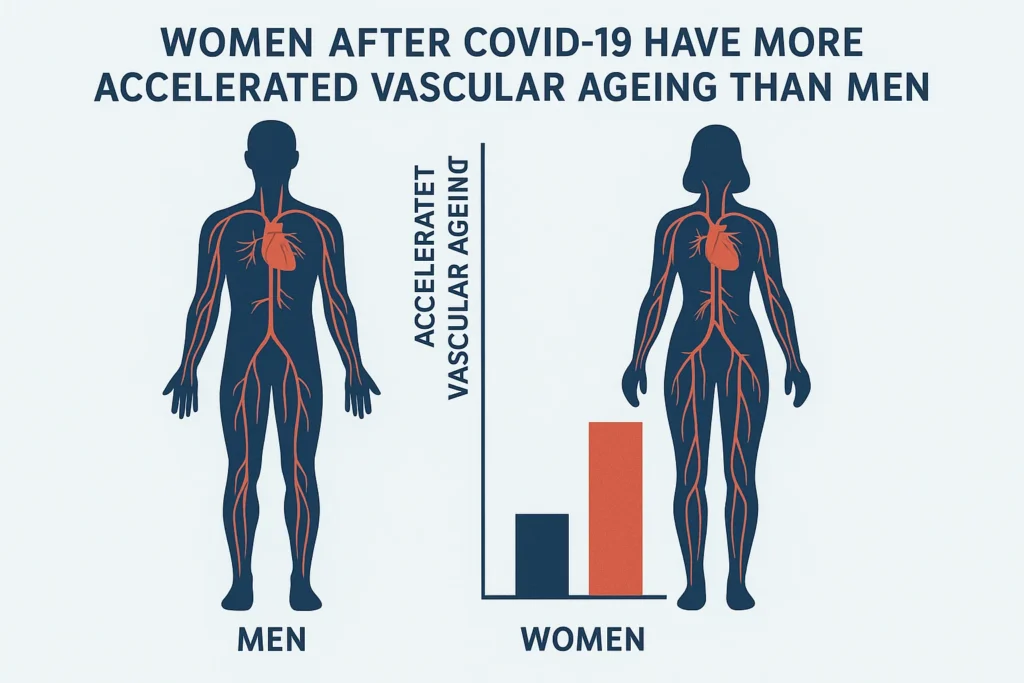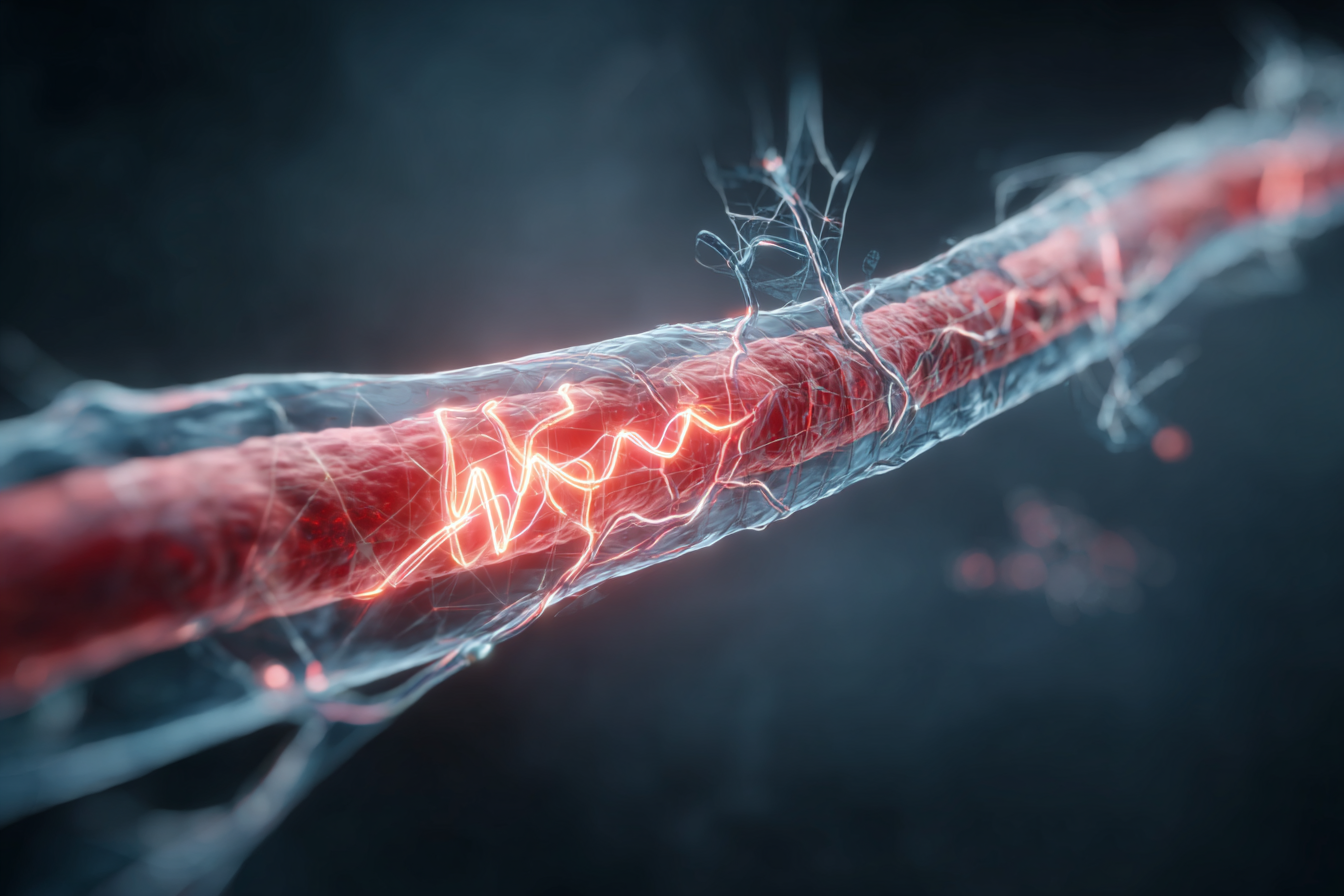The COVID-19 pandemic has probably ended as an international crisis but the health implications of this crisis are yet to be felt. In addition to the acute respiratory disease, survivors are at an increased risk of chronic illness, especially cardiovascular disease. A recently conducted multinational study, the CARTESIAN one, has identified that the COVID-19 infection is associated with accelerated vascular ageing, which is characterized by the premature stiffening of the arteries leading to the risk of heart disease, stroke, and other vascular issues.
With almost 2,400 participants in 18 countries, this study provides the most broadly evidenced evidence to date that there are long-term impacts on the vascular system by COVID-19, some of which are unexpectedly different between men and women.
What Is Vascular Ageing and Why Does It Have an Importance?
Vascular ageing This means that arteries become stiffer with age. Vascular age, in contrast to chronological age, is fixed. Patients with increased vascular ageing have an increased risk of cardiovascular events despite being relatively young.
Carotid femoral pulse wave velocity (PWV) the rate of travel of blood pressure waves in arteries is one of the best markers of vascular ageing. Increased PWV reflects stiffer arteries and research has demonstrated that each 1 m/s increase in PWV increases cardiovascular risk dramatically.
With PWV in mind, the CARTESIAN study could see a proper visualization of the COVID-19 impact on the health of the arteries several months post infection.
CARTESIAN Study: An International Project.
The CARTESIAN study (COVID-19 effects on ARTErial StIffness and vascular AgeiNg) enrolled more than 2300 participants in four categories:
COVID-19 negative controls
COVID-19 positive patients who are not in the hospital.
Hospitalized patients (non-ICU) positive with COVID-19.
COVID-19 positive, ICU patients
They were evaluated approximately six months after infection and again at 12 months. PWV was measured and the researchers controlled the confounding factors including age, sex, smoking and blood pressure, and the presence of cardiovascular disease.
Key Findings
COVID-19 Is Related to Rapid Vascular Ageing
The PWV of all COVID positive groups was much higher than that of controls. The average stiffness of arteries was equivalent to 5-10 years more vascular ageing than in uninfected people.
Females Are Imbalanced
Sex stratified analysis showed a dramatic difference:
The PWV of women who had a history of COVID-19 significantly increased even in those who had never been hospitalized. The highest effect (+1.09 m/s) was observed in ICU admitted women.
Men, by contrast, did not significantly differ with regard to vascular ageing with that of COVID negative men.
This implies that although men were at risk of higher mortality than women in acute COVID-19, the overall cardiovascular burden in women could be greater.
Chronic Symptoms Develop Vascular Disease
Women who still felt fatigued, out of breath or had other long COVID symptoms had stiffer arteries compared to those who never had any of these symptoms. This observation underscores the possible long-lasting manifestations of underlying heart damage.
Vaccination Provides Security
In women, PWV was reduced in women who had taken at least one dose of a COVID-19 vaccine significantly compared with unvaccinated women, even following infection. There seems to be a vascular-protective effect with vaccination, which can possibly minimize long term risks.
Signs of Partial Recovery
PWV in COVID positive individuals was not decreasing at the 12-month follow up or slightly improved, and arterial stiffness with age progressed naturally in uninfected controls. This implies that there is some amount of recovery, but high levels of stiffness are still present compared to baseline.

Why These Findings Matter
The CARTESIAN analysis shows critical data regarding the unnoticed cardiovascular cost of COVID-19:
Public health view: Vascular disease may have a significant long-term burden in almost 800 million survivors across the globe.
Women: The sex specific outcomes suggest paying extra attention to women survivors of COVID-19.
Prevention: Vaccination can both prevent acute disease and decrease chronic cardiovascular risks.
Clinical care: PWV measurement may become a useful instrument in the detection of high risk COVID survivors and in the development of treatment plans.
Patient/Survivor Implications of COVID-19.
Some steps to prevent vascular problems are to:
Exercise: Flexibility of the arteries is enhanced by regular aerobic exercise.
Eat healthy: A Mediterranean-style diet, with a high content of fruits, vegetables and omega-3 fatty acids helps maintain vascular functionality.
Check blood pressure: High blood pressure hastens the effects of ageing in the vessels and it must be managed.
Vaccination: Vaccination may also give cardiovascular benefits, even after infection.
Get follow up care: If you have ongoing symptoms, talk with your doctor about cardiovascular screening.
Conclusion
The CARTESIAN study presents a frightening yet encouraging message of how COVID-19 speeds up vascular ageing, especially in females, and how vaccination and recovery can help prevent the harm. Through additional research, clinicians can possibly know how to identify high risk survivors in their initial stage and put measures in place to prevent heart and vascular issues in the long term.
With the ongoing education on long COVID, one thing becomes evident it has a much broader impact than the lungs, changing how we perceive and respond to cardiovascular risk in the post pandemic world.
Reference:
Bruno RM, Badhwar S, Abid L, et al. Accelerated vascular ageing after COVID-19 infection: the CARTESIAN study. European Heart Journal. 2025. doi:10.1093/eurheartj/ehaf430

